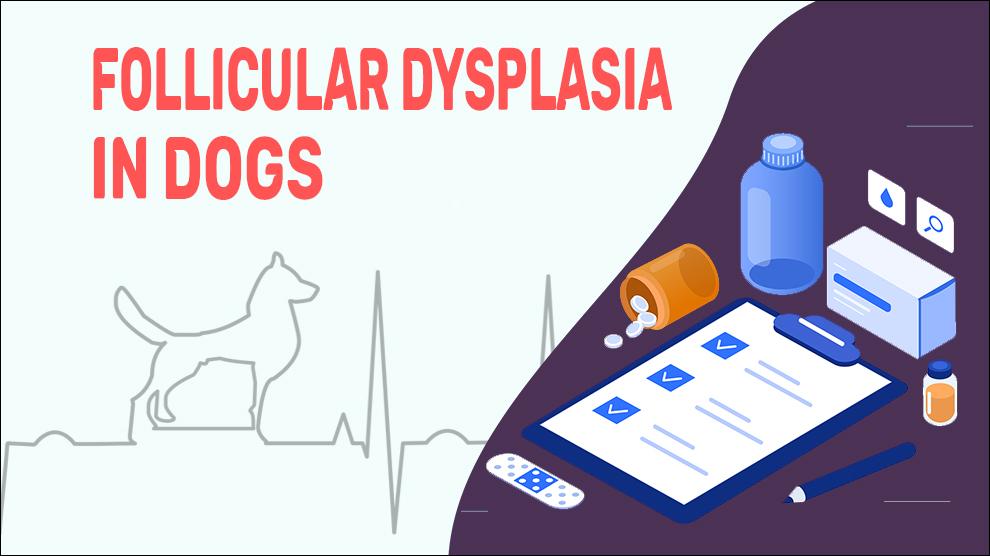What Is Follicular Dysplasia In Dogs?
Follicular Dysplasia is a rare, heterogeneous, inherited, progressive disorder due to an irregularity in the dog’s hair follicle. This typically appears as abnormal hair growth or changes in coat quality or hair loss that advances over a dog's lifetime.
Different types of follicular dysplasia have been documented; all these types are seemingly hereditary in origin. Black hair follicular dysplasia (BHFD) is the most documented of dysplasias, autosomal recessive inheritance limited to black coat regions affecting bicolor or tricolor dogs. Symptoms of BHFD are black-haired patches loss in B/W colored dogs and complete hair loss in black-haired dogs
Follicular dysplasia-induced Hair loss in dogs starts early in life, usually before the first 3 years of life, and progresses at a slow rate. Alopecia across the dog’s trunk gives it a “moth-eaten” appearance which is the distinguishing feature of this condition. Apart from the hair loss, dogs may present with flaking skin, fuzzy coats with localized color changes, and itching in affected areas.
While this disorder doesn’t have much impact on a dog’s health beyond hair loss, it can make the skin highly susceptible to secondary skin infections.
Symptoms Of Follicular Dysplasia In Dogs
- Progressive, permanent
- Scaling and flaking of the skin
- Red, bumpy, pus-filled skin pustules
- Dull coat quality
- Shorter hairs
- Itching
- Secondary infections
- Skin odor/darkening of the skin
Treatment Options For Follicular Dysplasia In Dogs
There is no treatment for most follicular dysplasias. However, secondary skin infections are treated by Antibiotics and Antifungal Medications.
Corticosteroids and Immunosuppressive Agents - Cortisone (dexamethasone, prednisone, prednisolone) and Cyclosporine (Atopica).
Cyclic Follicular Dysplasia – Melatonin treatment.
Secondary Pyoderma - Mild antiseborrheic or antibacterial shampoos and conditioners.
Home Remedies For Follicular Dysplasia In Dogs
Vitamin E, vitamin A supplements, and Omega essential fatty acids may be recommended.
Moisturizing rinses and sprays, Medicated shampoos, topical treatments, and antibacterial wipes can be prescribed.
Other Supportive therapies include oral antihistamines, medicinal baths, and Topical lipid skin treatments.
Discuss with a veterinarian dermatologist for any home care specific to your dog’s situation.
How To Prevent Follicular Dysplasia In Dogs?
Follicular dysplasia etiology is poorly understood. Specific causes are not yet known. However, Hereditary is, perhaps a factor in some breeds and it is better to evaluate the affected dogs before breeding or at least before getting a dog from a susceptible lineage and get the health checks done.
Affected Dog Breeds Of Follicular Dysplasia
American Cocker Spaniel, Basset Hound, Bearded Collie, Beagle, Dachshund, Gordon Setter, Papillon, Pointer, Saluki, Schipperke, Doberman Pinscher, Siberian Husky, Malamute, Airedale Terrier, Boxer, English Bulldog, Staffordshire Terrier, Portuguese Water Dog, Irish Water Spaniel, Curly-Coated Retriever, Chesapeake Bay Retriever, English Springer Spaniel, German Shorthaired Pointer, German Wirehaired Pointer, Rottweiler
Causes And Types For Follicular Dysplasia In Dogs
1. Causes:
- Hereditary
- trauma or injury
- Insect bite reaction
- Obstruction of a follicle opening (resembling a blocked pore in humans)
- Follicular inactivity/ Swollen hair follicle
- Allergic reaction
- Hormonal imbalance
- Sebaceous adenitis (Lack of sebum secretion)
2. Types:
Cyclic follicular dysplasia – Increased amount of daylight exposure to the dog during early spring or late fall. Other names are cyclic follicular dysplasia, canine recurrent flank alopecia, idiopathic cyclic flank alopecia, and seasonal flank alopecia. Most dogs get this dysplasia only once in their lifetime.
Color dilution dysplasia – This is thought to be caused by macromelanosomes of the hair shaft, leading to hair thinning and fracture associated with flaky and/or itchy skin. This condition affects all dilute-colored areas of the coat and often leads to complete hair loss.
Blue or Fawn coated Breeds are predisposed to this condition. Chihuahuas, Doberman Pinschers, Italian Greyhounds, Miniature Pinschers, Newfoundlands, Salukis, and Yorkshire Terriers.
Black Hair Follicular dysplasia – This condition affects dogs with bi or tri-colored coats.
Hair loss is specific to black hairs and complete black hair alopecia occurs before the dog turns 1 year old.
Follicular dysplasia of Rottweilers - This is a rare, localized condition that affects the tan areas of the dog’s face and legs. As of now, this condition is only identified in Rottweiler.
3. Mortality: There is no mortality documented because of follicular dysplasia.
4. Diagnosis:
- Routine hematology
- Surgical biopsy
- Histopathological examination of the skin
- Blood and urine tests
- Intradermal or blood allergy testing
5. Prognosis:
The prognosis for follicular dysplasia is guarded to poor. There are many conditions that can lead to alopecia in dogs. The veterinarian will have to try different tests to exclude several diseases that present with similar symptoms, such as allergies or parasitic infection. Fungal infections, hyperadrenocorticism, and hypothyroidism are tested by performing skin biopsies.
When To See A Vet For Follicular Dysplasia In Dogs?
Contact your vet right away, if you notice any of the following:
- Pruritus (Scratching, Itching, Rubbing, Licking)
- Reddening and thickening of the skin
Food Suggestions For Follicular Dysplasia In Dogs
- Choose a wholesome food, minimally-processed, that is free of preservatives, chemicals, hormones, and other toxic additives. Keep away from butylated hydroxyanisole (BHA) and ethoxyquin.
- An allergen-free (hypoallergenic) balanced diet (check for thickeners, coatings, flavors).
- Try an elimination diet after food sensitivity testing. Many prescribed medications for an autoimmune disease can cause GI and non-GI woes.
- Consider a diet with all essential nutrients and also provides plenty of antioxidants (combat free radicals).
- Consider a probiotic supplement.
Conclusion
Though the follicular dysplasia hair loss of affected dogs will be irreversible, the resultant skin issues recovery is good with proper treatment. Consult the veterinarian before using any Topical applications, wipes, antibacterial conditioning sprays, and medicated baths.

















